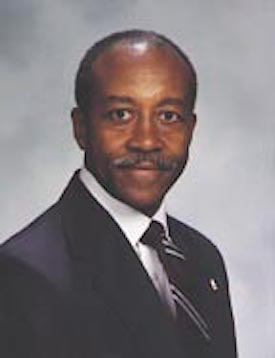
On August 5, 1999 President William Clinton appointed Gregory Lee Johnson U.S. Ambassador to Swaziland. He served in that post from November 16, 1999 to October 18, 2001. Johnson began his career in the Foreign Service in 1968 and has served in Vietnam (1968-1971). His next posts were in Japan (1972-1976), Brazil (1976-1980), and the Soviet Union (1981-1983). He has also served in Somalia, Canada, and as Interim Charge d’ Affaires in the U.S. Embassy in Stockholm, Sweden. Ambassador Johnson speaks Japanese, Portuguese, Russian, Swedish, and Vietnamese.
Gregory Lee Johnson was born in Ellensburg, Washington on July 18, 1945. His parents are Orville and Edith Johnson. He graduated from Franklin High School in Seattle, Washington in 1963 and four years later received a bachelor’s degree in political science from Washington State University. He later attended The American University, Washington, D.C. and received a master’s degree in international relations in 1968.
Besides his service abroad, Ambassador Johnson held assignments in the Department of State’s Bureau of Intelligence and Research and attended the U.S. Army War College between 1983 and 1988. From 1989 to 1992, Johnson returned to Japan where he served as Consul General at the U.S. Consulate General in Osaka-Kobe, Japan.
Johnson’s appointment as U.S. Ambassador to Swaziland provided him the opportunity to help deepen relationships with the United States. Swaziland was the last nation in Africa to be governed by a monarchy and was seen as the most stable nation in Southern Africa. Johnson‘s greatest challenge was in helping Swaziland confront its HIV/AIDS epidemic where one-fifth of its one million people were HIV-positive.
Ambassador Johnson helped negotiate the lifting of sanctions on cane sugar exports from Swaziland to the U.S. and played a key role in gaining commitment from the Government of Swaziland to contribute resources to the United Nations and the Organization of African Unity (OAU) peacekeeping efforts in in Northeast and West Africa.
Ambassador Johnson also helped Strategic Education Centers (SEC) in Swaziland. SEC is a Seattle, Washington based non-governmental organization (NGO) that provides academic skills and training in technology, sexual health, and disease prevention to girls and women in Africa. The organization’s founder and president is former Seattle First Lady Dr. Constance Rice. Johnson worked with Rice, King Mswati III, and others to open two centers located in Mbabane and Emcozini, Swaziland. They opened on September 11, 2001 before word of the Twin Towers attack reached them in Africa.
Ambassador Johnson’s appointment ended on October 18, 2001 and he and his wife, Lyla, returned to Seattle, Washington and retired there. He and his wife are the parents of two adult children, Carter and Kimberly.

